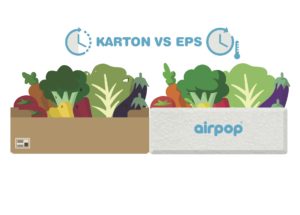Vegetables fresh for longer in an airpop (EPS) box
The Laboratory of Vegetable Crops, Department of Horticulture, Aristotle University of Thessaloniki, Greece has carried out research into the quality and shelf life of vegetables. In various test setups, broccoli, tomatoes and spinach were stored in airpop (EPS) boxes and in corrugated cardboard boxes. The results were astonishing:
Vegetables stay fresh for days longer when airpop (EPS) boxes are used. The reason? airpop® consists of 98% air, and air is a perfect insulator.

Conclusions that speak for themselves
The conclusions speak for themselves. Broccoli stored in airpop (EPS) boxes retains its nutritional value, colour and texture for at least 21 days, and there is almost no reduction in weight. Thanks to the superior insulating characteristics of the material, the temperature in the box remains low (5 °C) without the need to use ice.
If broccoli is stored in cardboard boxes (15 °C, the average temperature in supermarkets), the quality of the vegetables will rapidly deteriorate. The broccoli florets turn yellow within seven days, the nutritional value decreases greatly, and the weight reduces considerably. The broccoli is no longer suitable for consumption.
In cardboard boxes, vegetables can only be kept cold temporarily with ice, which then melts. Cooling with ice is associated with health risks, as water that comes into contact with vegetables causes microbial infections.
For the storage of tomatoes, it has also been irrefutably proven that airpop (EPS) packaging material contributes to improved freshness, shelf life and quality. The constant humidity provided by the closed EPS environment ensures that tomatoes sweat less than in a cardboard box. If the temperature in the box is kept at 10 or 20 °C, the quality will remain constant for a period of 15 days, for red ripe, orange and green tomatoes. If tomatoes are stored in a cardboard box, this period is much shorter.
For spinach, some is stored at a temperature of 5 °C, recommended for the storage of leafy vegetables, and the rest at 10 °C, as is common in the retail market. In airpop EPS boxes, the humidity remains constant, thanks to the insulating properties of the material. This makes it possible to keep spinach at a good quality level during a period of 10 days at 10 °C, or 15 days at 5 °C.
A severe variation in relative humidity for each day was recorded in the cardboard packaging. This quickly led to bacterial growth and discolouration of the leaf spinach.
airpop® (EPS) |
Cardboard |
|
| Insulating properties Vegetables suitable for consumption for longer |
No insulating properties Vegetables suitable for consumption for a short time |
|
| No health risks | Health risks present | |
| Less food wastage | More food wastage | |
| Environmentally friendly: minimal use of raw materials (2%) and resources, circular and endlessly recyclable | Not environmentally friendly, more raw materials and resources required during the production process |

Vegetables fresh for longer in an airpop box (EPS)
More information
You can find more detailed information about the research here. Do you have any questions about airpop (EPS) and the possibilities of 98% air? Then contact HSV’s particle foam engineers.
























